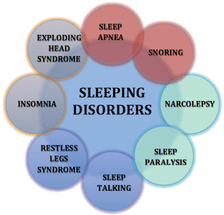Sleep disorders present a set of conditions that prevent people from sleeping well on a regular base. Regardless of the cause, sleep disorders are an issue that affects millions of people worldwide.

Sleep disorders 101
Most people from time to time experience sleeping problems due to specific health problems, hectic schedules, stress, and other factors. However, when these issues persist, they may lead to a sleeping disorder and when sleeping deprivation starts, it causes lower energy levels throughout the day and affects our concentration levels and can lead to negative mood swings and other health issues.
In some instances, the sleep disorder may be a symptom of mental or other health condition. Once treatment is obtained the sleeping problems may go away as well. When a mental or other health problem does not cause the sleeping disorder, the treatment includes a combination of lifestyle changes and medical treatments.
Symptoms of a sleep disorder
When it comes to a sleep disorder, one of the most important things do is to seek help right away. There is no point in waiting and letting your sleep disorder take its toll on your life. Some of the most common sleep disorder symptoms are:
- Can’t fall asleep and staying awake at night
- Can’t concentrate
- Anxiety
- Can’t complete a sleep cycle
- Depression
- Irritability
Common types of sleep disorders
The mentioned symptoms above may be a sign that you are suffering from some of the following sleep disorder conditions:
- Insomnia
- Parasomnia
- Sleep apnea
- Narcolepsy
- Restless leg syndrome
How is sleep disorder diagnosed?
It all starts with a physical exam in which a physician will gather information about your symptoms, current condition, medical history, and so on. In addition to that, the patient will need to undergo polysomnography, electroencephalogram, and genetic blood testing. That way the physician can get to the root cause of the sleep disorder.
Sleep disorder treatment
Each treatment is highly personalized and can vary depending on the underlying cause, as well as the type of sleeping disorder. However, generally speaking, most treatments include both lifestyle changes and medical treatment.
The medical treatment might include melatonin supplements, sleeping pills, surgery, breathing device, medication for a health issue that is causing the sleep disorder, dental guard (in case of teeth grinding), and so on.
A lifestyle change is typically recommended with medications, and it may include adding more fish and vegetables to the diet, minimize the sugar and coffee intake, following a sleeping schedule, reduce stress and anxiety by exercising, limit the use of tobacco and alcohol, and so on.
Be Positive
A sleep disorder can have a massive impact on everyone’s life. They can be highly negative if the condition is left untreated over a long period. What matters most is to deal with it as soon as possible and stick to what your physician prescribes and recommends. Face it head on and stick to your treatment plan, and you will be able to sleep well again in no time.

